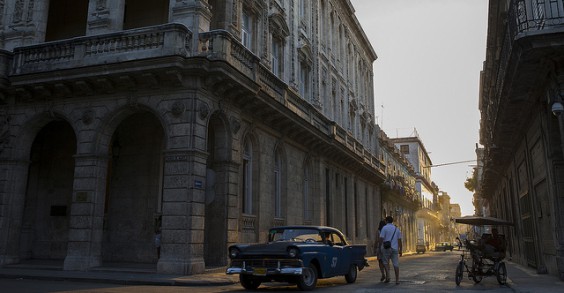Congratulations: Cuba Among the Ten Most Censored Countries
by Orlando Luis Pardo Lazo translated by Sandra Cirera-García / May 27, 2015 / No comments

The reestablishment of US-Cuba relations has done nothing to improve press freedom. Photo via Flickr user: Bryan Jones.
As Committee to Protect Journalists’ rankings indicate, the normalizing of US-Cuba relations does not mask the fact that Cuba will continue to be a one-party Communist state.
Cuba has been led by a dynastic succession since General Raúl Castro assumed power from his brother, the former Commander-in-Chief Fidel Castro, in 2008. It continues to accumulate “successes” in terms of violating human rights and censoring fundamental freedoms, such as freedom of speech.

- Is it worth-while to focus on the last images and letters coming from the inside of the last living utopia on Earth? Is Cuba by now a contemporary country or just another old-fashioned delusion in the middle of Nowhere-America? A Cold-War Northtalgia maybe? Can we expect a young Rewwwolution.cu within that Ancien Régime still known as The Revolution? I would like to provoke more questions than answers.

- Orlando Luis Pardo Lazo was born in Havana City and still resides and resists there, working as a free-lance writer, photographer and blogger. He is the author of Boring Home (2009) and is the editor of the independent opinion and literary e-zine Voces.
Indeed, in April the Committee to Protect Journalists (CPJ), headquartered in New York, published its analysis of the ten most censored countries in the world. These studies are based on a series of benchmarks such as “the absence of privately owned or independent media, blocking of websites, restrictions on electronic recording and dissemination, license requirements to conduct journalism, restrictions on journalists’ movements, monitoring of journalists by authorities, jamming of foreign broadcasts, and blocking of foreign correspondents.”
Cuba placed 10th in this cocktail of state despotism, as it continues to have “the most restricted climate for press freedom in the Americas. The print and broadcast media are wholly controlled by the one-party Communist state, which has been in power for more than half a century and, by law, must be in accordance with the goals of the socialist society.”
Other countries on this list of shame are: 1. Eritrea, 2. North Korea, 3. Saudi Arabia, 4. Ethiopia, 5. Azerbaijan, 6. Vietnam, 7. Iran, 8. China and 9. Myanmar. These are, beyond the ideological signs of left or right, the true spiritual allies of the Castros’ Cuba: repressive regimes, hiding or not behind the mask of meager “reforms” or a demagogic “transition” towards democracy.
The fact that US President Barack Obama recently moved to normalize relations with the Havana government, to restore diplomatic ties after half a century of isolationism, doesn’t mean much to the absolute power vocation of the Cuban military elite. Raúl Castro’s promise to step down from power in 2018 does not imply a hope of openness either, since the gerontocracy is already preparing its next dynastic succession. Colonel Alejandro Castro, General Raúl Castro’s son, will assume power, either on a one-person or a partocracy basis.
The Communist party monopolizes all legal press in Cuba, as admitted by our country’s constitution. Thus, public property in Cuba is, in practice, a disguise for private property. For its part, independent press within the island depends on support from abroad to survive, thanks to pro-democracy international NGOs and support of anti-Castro Cuban exiles.
The situation in the immediate future cannot be any more discouraging, despite the rise of news portals such as 14yMedio.com, led by renowned Havana-based blogger Yoani Sánchez. And the thing is that the Internet is a very useful tool for dictatorships also, which have learned to use it to their advantage. In the case of Cuba, this strategy involves the creation of hundreds of official sites, many of them dedicated to attacking independent communicators and pro-human rights activists, while others simply replicate the news of the official press ad nauseam.
The world’s democratic governments, including the Obama administration, shouldn’t abandon those from the island who are trying to recover the voice of a nation hijacked by a system less socialist than uncivil. Cuba is in need of global solidarity as a means of exerting effective pressure on the Havana authorities; otherwise, we will continue to appear on the infamy billboards, such as the top ten countries which violate freedom of speech, year after year.




